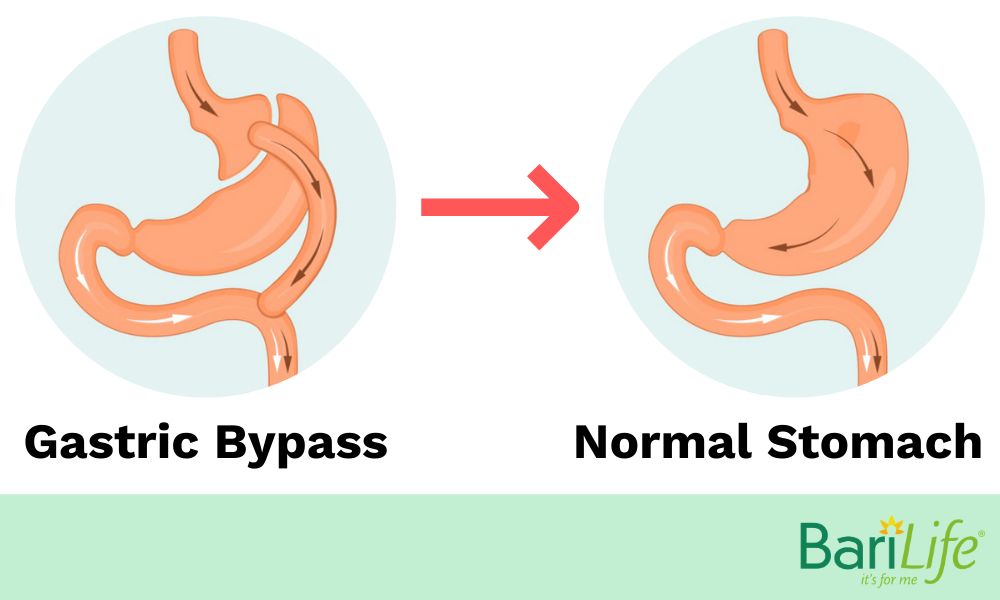
Gastric bypass surgery is a great option when weight loss hasn’t occurred through traditional means, such as diet and exercise. But sometimes, even after following all your doctor’s recommendations, significant complications still arise after your gastric bypass surgery, leading to the consideration of alternative options.
In some cases, gastric bypass reversal is considered. To fully understand if gastric bypass reversal is right for you and to make an educated decision, you need to understand gastric bypass surgery, potential complications that may lead to gastric bypass reversal and the nature of the reversal surgery.
What to expect with gastric bypass surgery
Gastric bypass is the most common type of bariatric surgery to combat obesity. The surgery produces long-term weight loss and can lead to an improvement in chronic obesity-related illnesses such as heart disease and diabetes.
During gastric bypass surgery, a small pouch is created from the stomach and connected to the small intestine. Per its name, part of the stomach and small intestine is bypassed and less food can be processed.
Gastric bypass surgery changes how your digestive tract handles the food you eat. Because the stomach is significantly smaller, you feel full after eating less food and stay satisfied for longer periods of time, leading to weight loss.
In most patients, gastric bypass surgery leads to positive outcomes and significant weight loss.
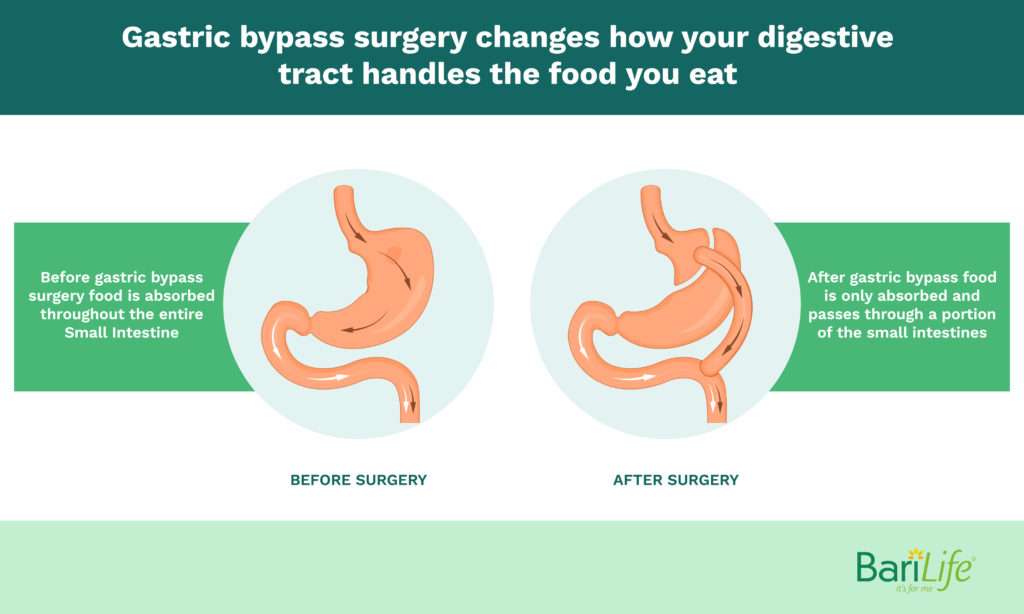
While gastric bypass is the most common bariatric surgery, it is also the most complex and has the potential for more complications. Even though it can be a great option for many, significant long-term side effects may cause a patient to consider gastric bypass reversal.
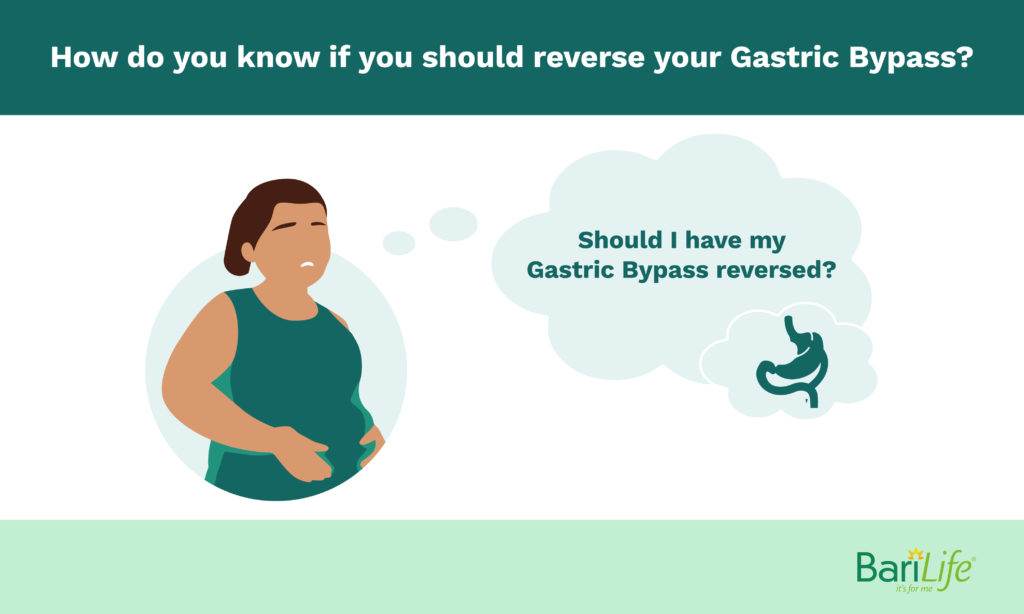
When should I consider gastric bypass reversal?
While your surgeon likely talked with you about the potential complications of gastric bypass surgery, such as long term vitamin or nutrient deficiencies requiring life-long supplementation, the surgery is generally safe and yields great outcomes for most patients.
But for some, side effects from surgery are too significant and gastric bypass reversal is considered.
Here are some reasons gastric bypass reversal may be needed:
- Severe food intolerances and nutritional complications. Food intolerances, such as the inability to eat solid foods, can become a significant problem for some patients after gastric bypass surgery.
- Malnutrition. Without being able to absorb enough vitamins and minerals due to the changed anatomy of the gastrointestinal tract, patients can develop malnutrition. Sustained malnutrition can lead to a variety of other health complications.
- Sustained nausea, vomiting, or chronic abdominal pain. Some patients experience chronic nausea, vomiting, or severe abdominal pain that doesn’t go away. If your symptoms become so severe that your daily functioning is impacted, it’s time to talk with your doctor.
- Metabolic complications such as postprandial hypoglycemia. After eating a meal, your blood sugar should rise due to the sugars in the food. With the metabolic condition called postprandial hypoglycemia, your blood sugar drops within four hours of eating a high carbohydrate meal, causing symptoms including anxiety, dizziness, headache, sweating, weakness, tiredness, or lightheadedness. In severe cases, fainting and seizures can occur.
- Dumping syndrome. Categorized by a group of symptoms including nausea, diarrhea, and lightheadedness, dumping syndrome is a result of rapid gastric emptying. In dumping syndrome, food moves directly from your newly formed stomach pouch into your small intestine without being fully digested, leading to unwanted and uncomfortable symptoms.
- Frequent ulcers and internal hernias. If severe enough, emergent surgery may be required and can lead to consideration of gastric bypass reversal.
If you find yourself struggling with post-surgical side effects, no matter how significant, review some of the educational material you received before and after your gastric bypass to make sure you’re taking the proper steps.
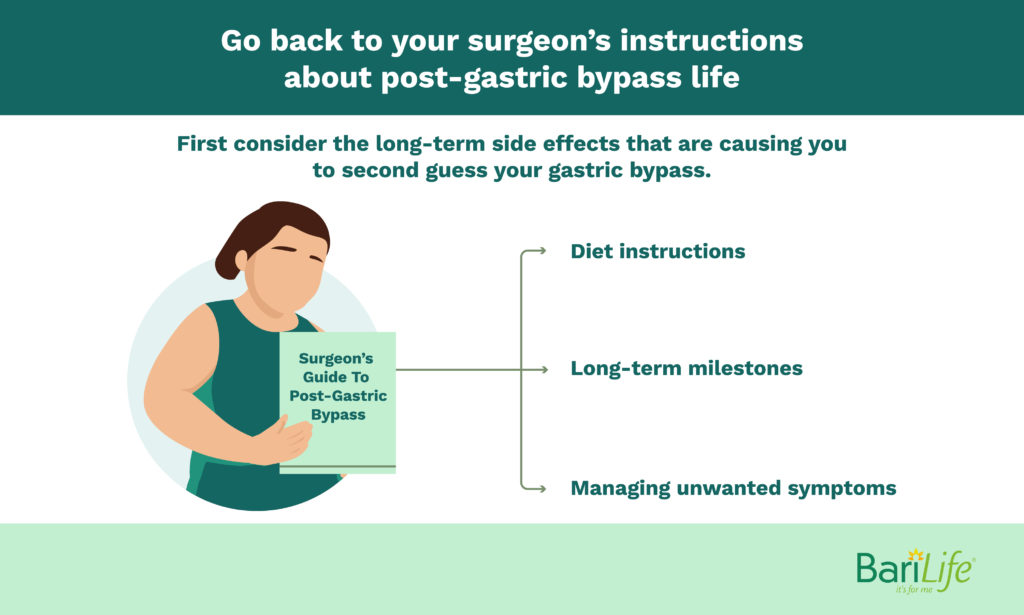
Follow your surgeon’s instructions and be diligent about adhering to guidelines to manage any unwanted symptoms. But sometimes, no matter how closely you adhere to recommendations, unwanted side effects persist and impact your daily life.
This is when gastric bypass reversal should be brought up in discussion with your doctor.
Can this be reversed?
Gastric bypass reversal is a safe and feasible surgical option for patients that have severe, unmanageable side effects following gastric bypass surgery. During gastric bypass reversal, the gastrointestinal anatomy is restored to normal.
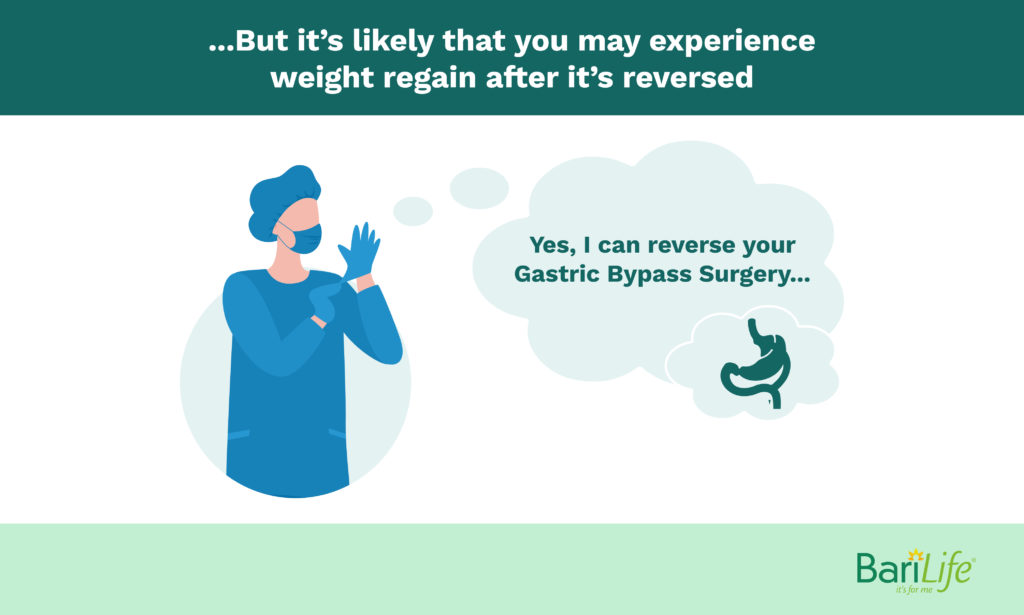
The reversal can help the patient return to their baseline of functioning and eliminate unwanted side effects from the original surgery. For most patients, it is well tolerated and leads to a resolution of symptoms.
After gastric bypass reversal, weight gain is likely to occur but most of the original side effects may subside. In some cases, the surgeon may recommend a sleeve gastrectomy to support continued weight loss and management during the gastric bypass reversal surgery.
What to expect with gastric bypass reversal
Gastric bypass reversal surgery returns the stomach and intestines back to their original placement. While the surgery can be done, it is complex and has the potential for further complications.
Since it is the second surgery in the area, there is more complexity and risk for leaks, increased bleeding, infection, and scar tissue formation. As such, gastric bypass reversal should only be considered after all other attempts have failed at managing post-surgical side effects.
Since the anatomy of the gastrointestinal system returns to normal with gastric bypass reversal, weight gain occurs after surgery. With a return to the normal anatomical structure, the stomach is able to process more food and the feeling of fullness takes longer to set in.
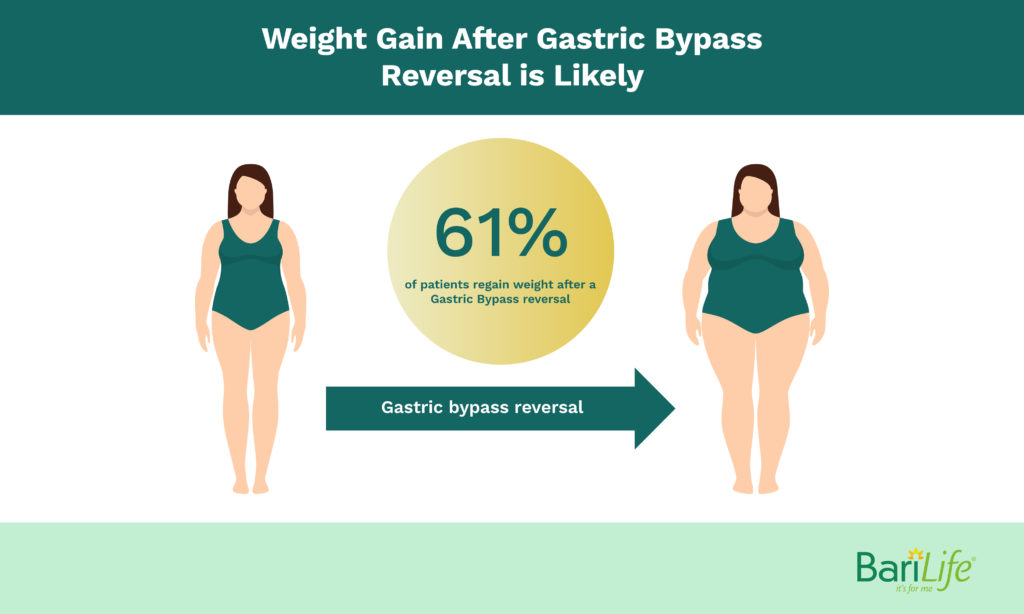
Since gastric bypass surgery causes such a drastic change to the gastrointestinal tract, gastric bypass reversal is equally as drastic, leading to a high potential for weight gain and exacerbation of obesity-related illnesses.
According to a 2019 study of 48 post-gastric bypass reversal patients, the average amount of weight regained after 4 years was 61%.
Conclusion
Gastric bypass reversal surgery is a potential surgical option if you’re struggling with significant side effects after gastric bypass. While it is a feasible and safe option, it is important to recognize it is not your only option.
Talk with your healthcare provider about your concerns and have a discussion to fully understand all your options.




I did paragraph my original response, hopefully if it does get approved it will be as I stated, while wordy did include paragraphing as what I have to say needed to be said. thanks…
Hi there – the length of your comment pushed it into spam, but we’re happy to have your comment posted 🙂
I’m going to try one last time as I originally wrote a comment several months ago, long for sure, but it was something that I’m very disappointed that if the writer and the company that runs this site didn’t at least think to have a respectful debate, regarding our differences of opinions.
I had a gastric bypass open reversal 10 1/2 years ago, 8 1/2 years status post lap rny.
My weight which I blog about (non monetized) is so that other patients don’t go through the reversal process without a lack of support for almost 8 years, now.
There is TOO much emphasis on regain post reversal in this pst, when the truth is, as more bariatric surgical patients get further out, they gain weight, even intact.
I am NOT anti-weight loss surgery, I think all of them can help many patients have the best chance of losing a lot of weight and keeping it off, long term.
But for those of us who’ve had to have a reversal and in my case, by the time I was to be reversed I was ready to die, whether or not I’d regain weight was not an issue for me.
But it IS for a lot of patients who are told they need a reversal to save their life who honestly think they would rather be dead than fat again.
And they are really close to finding how close they are to being dead versus fat again.
Long term a lot of us who had reversals due to severe hypoglycemia, severe nutrient deficiencies and the long term consequences from that and in also my case, I was going to die from all those pesky bleeding ulcers, I traded that in for weight fluctuations (I had regain issues prior to reversal due to med issues) Gastroparesis and serious heartburn whenever I drink or eat anything and I’m not alone, as a fair amount of those of us who had a reversal, but it was after 3 years post rny, seem to get stuck with gastroparesis, for those who weren’t sleeved whether it was to help possibly keep weight under control or prevent Gastroparesis,
Again, I am not anti-wls. I do think though given how many people have found me prior to this post being written of not wanting a reversal due to fear of regain, was worth trying to explain that weight regain should NOT be so highlighted, as it could potentially make a gastric bypass patient with catastrophic complications that aren’t the patient or surgeon’s fault they just happen, not be so likely to rectify their issues if a reversal can help save a patients life or give them a better quality of life than their complications are allowing them to have.
Did you get gastroperises after reversal or after gastric bypass? I’m going through dumling symptoms very lightheaded after I eat and I get hypoglecemic attack after a few hours sometimes earlier. Not to mention vitamin defiencies. I dont care to gain the Wright back , it’s the gastroperesis that I’m scared off and the fear of being on a feeding tube for the rest of my life… I need hope.
Hey I’m kinda thinking about reversal but I keep hearing it’s complicated and some also say that it’s not possible for a roux y gastric bypass so I’m curious about if it’s true and I also wanted to ask if you live a normal and healthy life after the reversal surgery and just in generell how your doing ?
I would love to hear from you
How did you know you started to have gastroparesis? I am 1.5 years post-bypass reversal and it’s been within the last few months that I just feel like whatever I eat is sitting in my stomach not going anywhere. It causes a pain under the rib cage and up to my esophagus that brings me to my knees. It hurts, I get quick fever/cold sweats, sick and nausea, and I get so bad that I force myself to throw up just to get whatever it is, out of my stomach enough to get me out of my fetal position on the floor in pain. I actually just emailed my bariatric surgeon/reversal surgeon and asked if he will see me again to discuss a little testing to rule out things such as gastroparesis. I hate to think of what it would lead to as the entire last 3.5 years of my life have been clouded in the gastric bypass world. I would love to just be “normal” again and thought I would be after the reversal. Now, I’m finding that’s not the case. Sucks! I know your post is 3 years old but I just read it and thought I’d ask. 🙂
i need help to find a bariatric doctor that will do my gastric bypass the right way please i m all desformed now
A good friend of mine had the gastric bypass about eight years ago. She developed a leak had many many complications. About year and half later had it reversed by a specialist. Her health improved until about two months ago she had to have her gallbladder out. They had to do a open operation because of her history. She has since been readmitted at least six times with abdominal pain and recollection of fluid. A drain has been put in and taken out several times. They really can’t say why. The latest is it her lymphatic system is not working properly. Any ideas or suggestions are welcomed. She needs answers thanks
How do you find a specialist that can reverse this?
I am 16 mos post bypass and have followed all the food rules but am having more frequent bowel incontinence. I had gallbladder removal a year before my Roux-en-Y. The bowel incontinence started after my chemotherapy in 2006 with four times a year. But since my bypass it has gotten worse to the point where I am unable to go, do my job, which is physician education and a room full of physicians. Has anyone ever had this issue?
I had gastric bypass surgery in 2000, and now being advised to reverse it. After 23 years I don’t think any surgeon would operate on me. The bypass affected my kidneys all these years later, and now I have too much oxolate in my urine,(my kidneys)threatening to go into failure if I can’t get it in control with diet. There’s more to complications than ever stated. Just an FYI for those contemplating and those post.
I had rny 24 years ago and had no complications until 2020 when I got severe malabsorption and kidney stones and chronic kidney disease. Now I have been diagnosed with enteric hyperoxaluria and diet is not helping. Would anyone take a chance on a reversal 24 years after rny. I have been told it is a serious complicated surgery. As far as weight regain I am not all that concerned as I spent 10 years in therapy discussing the whys of my overeating and have a handle on that, so I don’t fear falling into old, bad eating habits, since most of overeating is (and for me) rooted in your psyche. Any thoughts would be appreciated.
This is an interesting topic that I would like to learn more about. Can you provide some additional information on the effects and potential benefits of gastric bypass reversal?
This information is really helpful. I’m 2 years out from my gastric bypass surgery and I’ve been considering reversal options. It’s great to see a detailed explanation of what to expect after the reversal process. I’ll definitely share this post with my doctor and friends who are also considering reversal. Thank you for sharing!
I have lost a lot of weight but the side affects are causing so much pain, no matter what I eat or drink it comes back up and not knowing when to urniate or have a BM is the worse and all I hear is you stomach and intestines are not awake or healed yet. I live in Dumpville, I have been sick as a dog for one whole week now, I am afraid to eat or drink because I know what’s coming, I need the reversal. Am I giving up too soon?